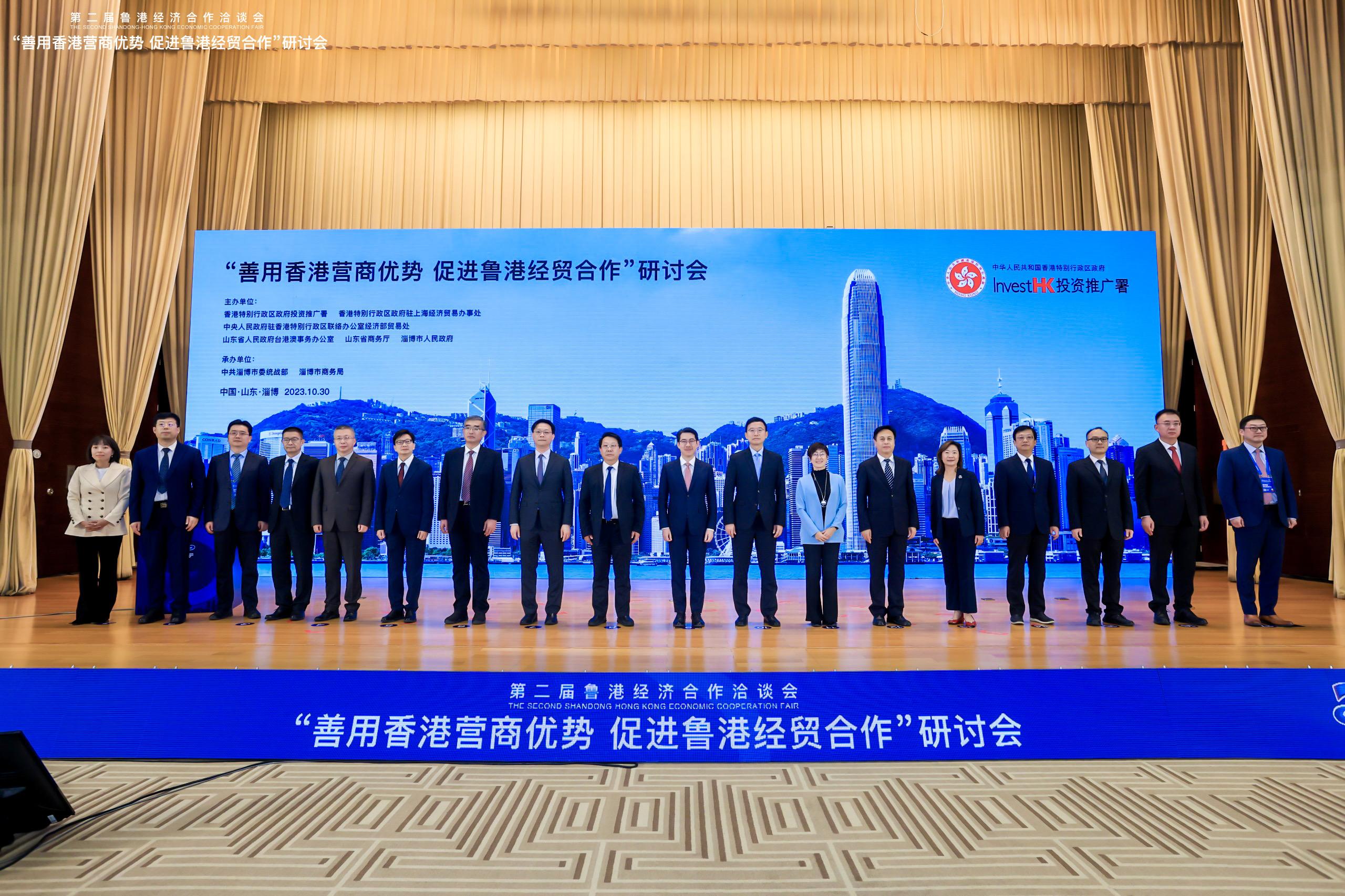InvestHK encourages Shandong companies to tap new business opportunities from Hong Kong to go global (with photos)
​Invest Hong Kong (InvestHK) hosted a seminar in Zibo, Shandong Province today (October 30), encouraging Shandong enterprises to make use of Hong Kong’s business advantages and opportunities amid the Belt and Road Initiative (B&RI) and the Guangdong-Hong Kong-Macao Greater Bay Area (GBA) development to go global.
Entitled “Seminar on Business Advantages of Hong Kong: Enablers of Economic and Trade Co-operation with Shandong”, the event was co-organised by InvestHK, the Hong Kong Economic and Trade Office in Shanghai (SHETO) of the Government of the Hong Kong Special Administrative Region (HKSAR), the Commercial Office of Economic Affairs Department of the Liaison Office of the Central People’s Government (LOCPG) in the HKSAR, Taiwan, Hong Kong and Macao Affairs Office of People’s Government of Shandong Province, the Department of Commerce of Shandong Province, and the People’s Government of Zibo Municipality. It was also supported by the United Front Work Department of Communist Party of China (CPC) Zibo Municipal Committee, and the Commerce Bureau of Zibo.
The seminar began with welcoming remarks by the Acting Director-General of Investment Promotion at InvestHK, Dr Jimmy Chiang; Second-level Inspector from the Commercial Office of Economic Affairs Department of the LOCPG in the HKSAR Mr Yan Yongqing; the Director of the Taiwan, Hong Kong and Macao Affairs Office of People’s Government of Shandong Province, Mr Zhang Liansan; Deputy Director of the Department of Commerce of Shandong Province Mr Cui Hongguang, and the Minister of the United Front Work Department of CPC Zibo Municipal Committee, Mr Gai Weixing. The Director of the SHETO, Mrs Laura Aron, also attended the event.
Dr Chiang said, “Hong Kong has already been stepping up its efforts to seize the opportunities arising from the national key strategies including the National 14th Five-Year Plan, the GBA development, and the B&RI. Under ‘one country, two systems’, Hong Kong continues to integrate into the overall development of the country, by reinforcing its traditional status as an international financial, transportation and trade centre, as well as a centre for international legal and dispute resolution services in the Asia-Pacific region. The city is also moving full steam to develop its new positioning in the emerging centres, namely international aviation hub, international innovation and technology (I&T) hub, regional intellectual property trading centre, and East-meets-West centre for international cultural exchange. Shandong enterprises can make good use of Hong Kong’s financial, logistics, trade, legal and other professional services, as well as its advantages in aviation, I&T, intellectual property and culture and art fields to expand in new markets.”
Delivering his remarks, Mr Yan said, “Hong Kong has been the largest source of foreign direct investment in Shandong and its largest investment destination. The city is the most important platform for Shandong via which to open up to the world. The co-operation between Shandong and Hong Kong has strong complementarity with huge market growth potential in various industries. In the future, the two places will have bright prospect working together to build key industrial clusters and develop innovation economics. As the representative of the Ministry of Commerce in Hong Kong responsible for the economic and trade co-operation between the two places, the Commercial Office of the Economic Affairs Department of the LOCPG in the HKSAR is willing to provide support and services for all Mainland enterprises, including Shandong enterprises, to invest in Hong Kong and expand to overseas markets via the city.”
Representing the Shandong Provincial Government authorities, Mr Zhang and Mr Cui told the audience that Shandong will continue to deepen the economic and trade co-operation with Hong Kong. They both encourage Shandong enterprises to use Hong Kong as a platform to go global.
Representing the Zibo government authorities, Mr Gai presented the economic development of Zibo City at the seminar and the hope to strengthen economic, trade and cultural exchanges with Hong Kong.
The Head of Business and Talent Attraction/Investment Promotion of InvestHK in Shanghai, Mr Arthur Lam, introduced Hong Kong’s business environment at the keynote speech and the diverse services InvestHK offers Mainland clients. The Chief Immigration Officer of the SHETO, Mr Ma Man-tak, also provided a briefing on Hong Kong’s latest immigration schemes and services for Mainland residents.
The Head of Mainland and GBA Business Development of InvestHK, Ms Loretta Lee, hosted a panel discussion on Shandong-Hong Kong economic and trade collaboration at the seminar with speakers including Senior Manager of Business Development of Hong Kong Science and Technology Parks Corporation (HKSTP) Mr Matt Hu; Vice President of Global Issuer Services of Hong Kong Exchanges and Clearing Limited Ms Sarah Zhang; and the Director, Tax and Business Advisory, Mergers and Acquisitions, Jinan Branch, Deloitte China, Ms Cathy Li. They discussed how HKSTP can assist Shandong companies to develop I&T in Hong Kong, how Shandong companies make good use of Hong Kong’s listing and financing environment, and the reasons to conduct merges and acquisitions activities in the city. Vice President of Dongyue Fluorosilicone Science and Technology Co Ltd Mr Li Yuwen also shared experience in expanding their business in Hong Kong at the seminar.
For photos of the seminar, please visit: www.flickr.com/photos/investhk/albums/72177720312312403.





